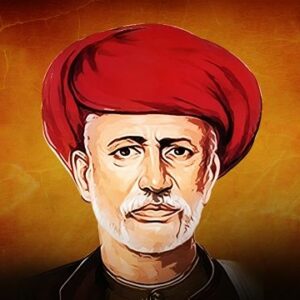No one in nineteenth-century India would have considered teaching their girls. But Mahatma Jyotiba Phule was far ahead of his time in terms of vision. As a trailblazer in the field of women’s education, he founded the first girls’ school in India. Also distressing to him were the crimes committed against the populace in the name of caste. Since he was born into a so-called lower caste household, he had firsthand contact with the injustices and tortures associated with the caste system. Intelligent and idealistic, he refused to accept unjustifiable behavior from others and resolved to improve society. He understood the value of education and, after marrying at a young age, began teaching his wife to read and write. Fortunately, his wife Savitribai was a kindred spirit who enthusiastically supported and assisted him in his humanitarian initiatives. He founded the Satya Shodhak Samaj with the intention of safeguarding the so-called lower castes from exploitation and injustices since he was very upset by the caste system’s widespread abuses. His ceaseless attempts to eliminate social inequality won him the moniker “Father of the Indian Social Revolution.”
Youth and Early Life
He was born in the Satara area of Maharashtra as Jyotirao Phule. His family belonged to the “Mali” caste, which was deemed inferior to the Brahmins. His father, Govindrao, was a vegetable dealer. China was the name of his mother, and he had one sibling.
Jyotiba’s mother passed away when he was barely nine months old. His father refused to remarry and instead selected a nurse to care for his two sons. Thankfully, the nurse was a compassionate woman who took excellent care of the children.
He attended elementary school but dropped out to work on farms. However, the child’s neighbors, recognizing his intelligence, persuaded his father to allow him to continue his schooling.
As was usual in those times, his father arranged his marriage when he was approximately 13 years old.
Jyotiba attended and graduated from the nearby Scottish Mission High School in 1847. While at school, he was inspired by reading the lives of Shivaji and George Washington. Additionally, he was profoundly affected by Thomas Paine’s ‘Rights of Man’
Once, he attended the wedding of a Brahmin acquaintance and was humiliated because he belonged to a “lower caste.” This event opened his eyes to the ridiculousness of the caste system, and he decided to combat inequality.
He was troubled by the widespread disparities and injustices in Indian society and resolved to fight for the right to equality for all, regardless of religion, caste, or gender.
A Final Years
Jyotiba understood the significance of education and believed that a society can only emerge from darkness when every member had access to education. He began his wife’s education at home. His wife, fortunately, shared his idealistic ideas.
In 1848, he gave form to his ambitions by establishing the first school for girls. He requested that his wife instruct the girls, to which she readily consented. But society was not prepared to accept this, so Jyotiba and his wife were forced to abandon their home.
The school was accessible to females from all social classes. Girls of many religions, castes, and socioeconomic backgrounds would attend school. However, the school was closed briefly due to a lack of money.
There were numerous Brahmins, Christians, and Muslims who were pleased by his efforts to eliminate inequity and supported him unreservedly, despite the fact that his social undertakings made him unpopular among the strict Brahmins.
In 1851, he founded and taught at a larger girls’ school. The girls were taught reading, math, geography, and history, among other subjects. The school’s growing popularity inspired him to launch additional schools of the same type.
A visionary who was decades ahead of his time, he opposed child marriage and advocated widow remarriage. These measures were not well received by the religious community.
He was deeply distressed by the predicament of widows, particularly the treatment of widows who became pregnant after the loss of their spouses as a result of other men’s mistreatment. He established a safe place for such widows to give birth and care for their newborns.
In opposition to the practice of untouchability, Jyotiba and his wife welcomed members of the so-called lower castes into their homes and permitted them to drink water from their wells. This infuriated members of his own caste, but he never cared what others believed.
In his poetry, he criticized the narrow-mindedness of society and the cunning of Brahmins who exploited the gullibility of farmers and other castes.
In 1873, he founded the Satya Shodhak Samaj, a group whose mission was to end the exploitation of the so-called lower castes. He desired to establish a society based on equality, togetherness, and humanistic principles.
Phule’s Major Opera
He was a pioneer in the field of education for women. At a time when women were among the most oppressed members of society, Jyotiba’s initiative to educate them stunned everyone. However, he persisted and constructed other schools for females from diverse backgrounds.
Personal History and Legacy
As a young man, he wed Savitribai, who was just nine years old. She became a feminist and social activist in her own right, completely supporting her husband’s idealistic stances.
The couple did not have any children of their own. They adopted a baby boy from the home they operated for expectant widows. The youngster became a physician and continued his parents’ history of social work.
In May 1888, the famous reformer from Mumbai, Rao Bahadur Vithalrao Krishnaji Vandekar, bestowed the title “Mahatma” upon Jyotirao Phule for his selfless contribution to humanity.
In July 1888, he suffered a paralytic stroke. Over the next few years, his health deteriorated, and he died in November 1890, surrounded by family and friends.
Estimated Net Worth
Jyotirao Phule’s estimated net worth is $1 million and his primary source of income is intellectual and revolutionary work. We lack sufficient evidence regarding Jyotirao Phule’s cars and lifestyle.


